St. Alphonsus Liguori - The Twelve Steps to Holiness and Salvation
Here you can read online St. Alphonsus Liguori - The Twelve Steps to Holiness and Salvation full text of the book (entire story) in english for free. Download pdf and epub, get meaning, cover and reviews about this ebook. year: 1986, publisher: Saint Benedict Press and TAN Books, genre: Religion. Description of the work, (preface) as well as reviews are available. Best literature library LitArk.com created for fans of good reading and offers a wide selection of genres:
Romance novel
Science fiction
Adventure
Detective
Science
History
Home and family
Prose
Art
Politics
Computer
Non-fiction
Religion
Business
Children
Humor
Choose a favorite category and find really read worthwhile books. Enjoy immersion in the world of imagination, feel the emotions of the characters or learn something new for yourself, make an fascinating discovery.
- Book:The Twelve Steps to Holiness and Salvation
- Author:
- Publisher:Saint Benedict Press and TAN Books
- Genre:
- Year:1986
- Rating:5 / 5
- Favourites:Add to favourites
- Your mark:
- 100
- 1
- 2
- 3
- 4
- 5
The Twelve Steps to Holiness and Salvation: summary, description and annotation
We offer to read an annotation, description, summary or preface (depends on what the author of the book "The Twelve Steps to Holiness and Salvation" wrote himself). If you haven't found the necessary information about the book — write in the comments, we will try to find it.
St. Alphonsus Liguori: author's other books
Who wrote The Twelve Steps to Holiness and Salvation? Find out the surname, the name of the author of the book and a list of all author's works by series.
The Twelve Steps to Holiness and Salvation — read online for free the complete book (whole text) full work
Below is the text of the book, divided by pages. System saving the place of the last page read, allows you to conveniently read the book "The Twelve Steps to Holiness and Salvation" online for free, without having to search again every time where you left off. Put a bookmark, and you can go to the page where you finished reading at any time.
Font size:
Interval:
Bookmark:


Permissu Superiorum C.SS.R.
| Nihil Obstat: | Patrick J. Supple |
| Censor Librorum |
| Imprimatur: |  William Cardinal OConnell William Cardinal OConnell |
| Archbishop of Boston |
Previously published under the title The School of Christian Perfection by Mission Church Press, Boston, Mass. Retypeset in 1986 by TAN Books and Publishers, Inc.
Library of Congress Catalog Card No.: 86-50419
ISBN: 978-0-89555-298-3
Typography is the property of TAN Books and may not be reproduced, in whole or in part, without written permission from the publisher.
TAN Books
Charlotte, North Carolina
2010
Thou shalt love the Lord thy God with thy whole heart, and with thy whole soul, and with thy whole mind. This is the greatest and the first commandment. And the second is like to this: Thou shalt love thy neighbour as thyself. On these two commandments dependeth the whole law and the prophets.
Words of Our Lord Matthew 22:37-40)

St. Alphonsus Liguori
1696-1787
Bishop, Founder of the Redemptorists,
and Doctor of the Church
ST. ALPHONSUS LIGUORI
St. Alphonsus Mary de Liguori was born in 1696 near Naples, Italy, to a noble Neopolitan family. He was the son of a captain of the royal galleys. St. Alphonsus received a doctorate in both canon and civil law at the age of sixteen, and practiced law very successfully for eight years. But he abandoned the practice of law to become a priest, being ordained in 1726.
In 1732 St. Alphonsus founded the Congregation of the Most Holy Redeemer, the Redemptorists. This order was established in the face of huge difficulties; it was even divided by a schism at the time of St. Alphonsus death. The Redemptorists have become famous for giving missions to enkindle and rejuvenate souls with true religious fervor.
In 1762 St. Alphonsus was obliged to become Bishop of St. Agatha. As bishop he reformed his small but slack diocese, but chronic ill health forced him to retire and he devoted himself anew to ascetical and moral theology. His experience in a lay profession, combined with natural common sense and sweetness of disposition, helped much to make him the best known of all moral theologians.
St. Alphonsus wrote numerous books, including his Moral Theology; of his many excellent devotional works, the masterpiece entitled The Glories of Mary is the most famous. He also spent much time combating anticlericalism and the heresy of Jansenism, and he was involved in several controversies regarding probabilism.
During the last years of his life St. Alphonsus suffered from ill health, especially from rheumatism which left him partially paralyzed. He experienced the dark night of the soul for several years toward the end of his life, but this period of suffering was followed by a period of peace and light during which he experienced visions and ecstasies, performed miracles, and made prophecies that later came true.
St. Alphonsus died in 1787, within two months of his 91st birthday. He was canonized in 1839, and in 1871 Pope Pius IX declared him a Doctor of the Church. His body rests in the church of his fathers at Pagani di Nocera.
PREFACE
In the ascetical writings of the holy Bishop and Doctor of the Church, St. Alphonsus de Ligouri, there is a characteristic charm and an irresistible attraction. Whoever reads them with the proper dispositions will discover in them an indefinable something that appeals to the heart and stirs it to its very depths. We imagine we see the loving personality of the holy Bishop before us, and hear the words of eternal life from his very lips. According to a beautiful legend, the visitor at the shrine of St. John at Ephesus can hear the pulsations of the Saints heart enclosed in the tomb. The heart of Alphonsus still throbs in his ascetical writings, where the whole being of the Saint seems enshrined. Little wonder therefore that the reverence and love entertained towards him in life should have passed to his edifying works, the reflex of his very self. There are few ascetical writers more widely known and more sincerely loved than St. Alphonsus.
The present volume is made up of choice selections from the various ascetical writings of the Saint. The order of virtues considered is that followed by the spiritual sons of St. Alphonsus in the Congregation of the Most Holy Redeemer. For each month of the year is assigned a particular virtue to which they are to devote their especial attention. This is a practice highly recommended by the masters of the spiritual life, and is fraught with the happiest results. It is hoped that the faithful will derive spiritual profit and pleasure from this course in The School of Christian Perfection.
C. J. W.

I am the light of the world; he that followeth me, walketh not in darkness, but shall have the light of life. John 8:12
Chapter 1
I am the light of the world; he that followeth me, walketh not in darkness, but shall have the light of life.
John 8:12
Faith is a divinely infused virtue by which man believes, on Gods authority, what God has revealed and teaches through His Holy Church. St. Paul calls faith the substance of things to be hoped for, and the evidence of things that appear not. ( Heb. 11:1). Faith is indeed the substance of things to be hoped for, that is to say, the foundation of our hope, for without faith, hope could not exist. Faith is likewise an evidence of the unseen, the evidence of things that appear not.
It is quite true that there is a bright and a dark side to the practice of holy faith. Its bright side is the marks of credibility that assure us beyond shadow of doubt that our faith is the true and only faith. Its dark side is the truths themselves which are veiled from our eyes. The proofs for the truth of our holy faith are so clear that, as Pico of Mirandola says, a man must be wholly bereft of reason to refuse them credence. Thy testimonies, O Lord, are exceedingly credible, says the Psalmist. ( Ps. 92:5). Consequently, unbelievers have no excuse for refusing to submit their reason to the teachings of our holy faith. He who believes not, is already condemned, says our Divine Saviour. On the other hand, God has willed that the objects of our belief should remain obscure in order that, by faith, we may merit a reward. From what has been said, it follows that faith gives us knowledge which surpasses in dignity all scientific truths. Behold, exclaims Job, how great is our God; he exceedeth all our knowledge. ( Job 36:26).
Our holy faith is a treasure of unspeakable value, for in it we possess first of all a divine light which serves to guide us safely on the way to Heaven. That which we perceive with our senses or comprehend with our reason may and often does lead us astray. The truths of faith, on the contrary, are revealed by God, who can neither deceive nor be deceived. In the second place, faith furnishes us with an excellent means of showing our reverence and respect for God.
It is no more than right that we subject to God our will by the observance of His holy law, and our reason by believing His infallible word. Were man to believe only that which he sees and understands, would he be giving honor to God thereby? Assuredly not. But we undoubtedly give honor to God when we accept as certain what God has revealed, though we may neither see nor comprehend it, and believe not because we understand but simply because God has revealed it. In the third place, faith supplies us with an abundant source of merit. If the truths proposed for our acceptance were so clear and comprehensible that we could not reasonably refuse our assent, their acceptance would in no way be meritorious, for the merit of faith consists in this, that we accept and believe the truths proposed, freely and without constraint. St. Gregory expresses this truth in the following words: Faith loses its merit when human reason furnishes a proof. ( Hom. 26). Our Blessed Saviour commends those who accept the truths of faith without being able to perceive or comprehend them: Blessed are they that have not seen, and have believed. ( John 20:29).
Font size:
Interval:
Bookmark:
Similar books «The Twelve Steps to Holiness and Salvation»
Look at similar books to The Twelve Steps to Holiness and Salvation. We have selected literature similar in name and meaning in the hope of providing readers with more options to find new, interesting, not yet read works.
Discussion, reviews of the book The Twelve Steps to Holiness and Salvation and just readers' own opinions. Leave your comments, write what you think about the work, its meaning or the main characters. Specify what exactly you liked and what you didn't like, and why you think so.

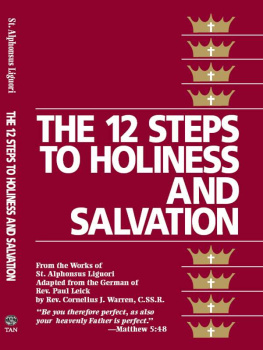
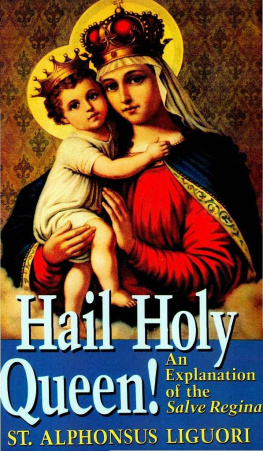
![St. Alphonsus Liguori - Visits to the Blessed Sacrament (with Supplemental Reading: Novena of Holy Communions) [Illustrated]](/uploads/posts/book/269658/thumbs/st-alphonsus-liguori-visits-to-the-blessed.jpg)


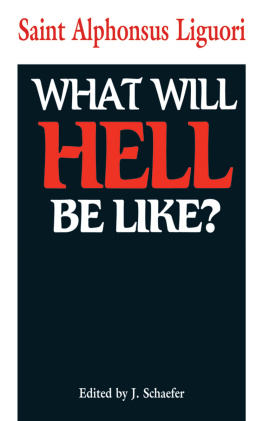
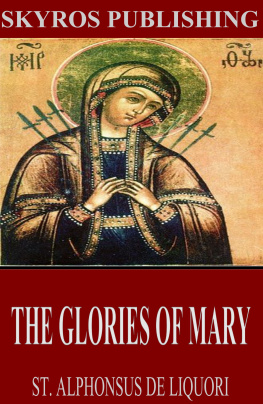

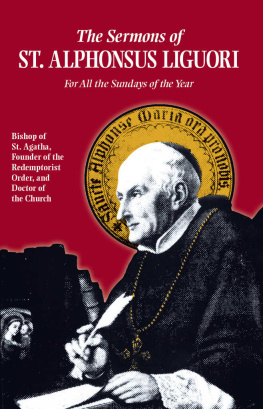
![Saint Alphonsus de Liguori - The Saint Alphonsus de Liguori Collection [30 Books]](/uploads/posts/book/134324/thumbs/saint-alphonsus-de-liguori-the-saint-alphonsus-de.jpg)